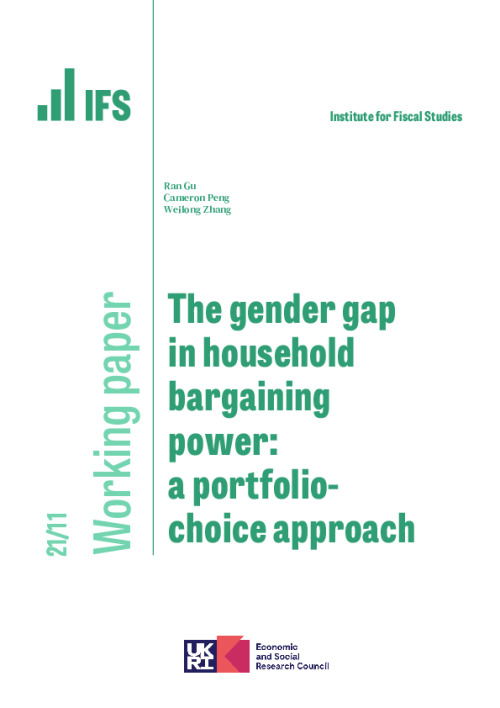Downloads
We quantify how bargaining power is distributed when spouses make financial decisions together. We build a model in which each spouse has a risk preference and must bargain with each other to make asset decisions for the household. By structurally estimating the model with longitudinal data from Australian households, we show that the average household's asset allocation reflects the husband's risk preference 44% more than the wife's. This gap in bargaining power is partially explained by gender differences in income and employment status, but is also due to gender effects. We provide further evidence that links the distribution of bargaining power to views on gender norms in the cross-section.
Authors

Research Associate University of Essex
Ran is an IFS Research Associate and a Lecturer at the University of Essex interested in understanding household and firm behaviour.

Cameron Peng

Weilong Zhang
Working Paper details
- DOI
- 10.1920/wp.ifs.2021.1121
- Publisher
- Institute for Fiscal Studies
Suggested citation
R, Gu and C, Peng and W, Zhang. (2021). The gender gap in household bargaining power: a portfolio-choice approach. London: Institute for Fiscal Studies. Available at: https://ifs.org.uk/publications/gender-gap-household-bargaining-power-portfolio-choice-approach (accessed: 30 June 2024).
More from IFS
Understand this issue

Sure Start achieved its aims, then we threw it away
15 April 2024

Social mobility and wealth
12 December 2023

If you can’t see it, you can’t be it: role models influence female junior doctors’ choice of medical specialty
24 April 2024
Policy analysis

How do the last five years measure up on levelling up?
19 June 2024

Making mortgage guarantees permanent will help some first-time buyers, but only if they can afford a bigger mortgage
6 June 2024

What has happened to earnings since 2019?
31 May 2024
Academic research

Income inequality in Ireland, 1987–2019
28 June 2024

Components of the evolution of income inequality in Sweden, 1990–2021
28 June 2024

The intergenerational elasticity of earnings: Exploring the mechanisms
3 June 2024
